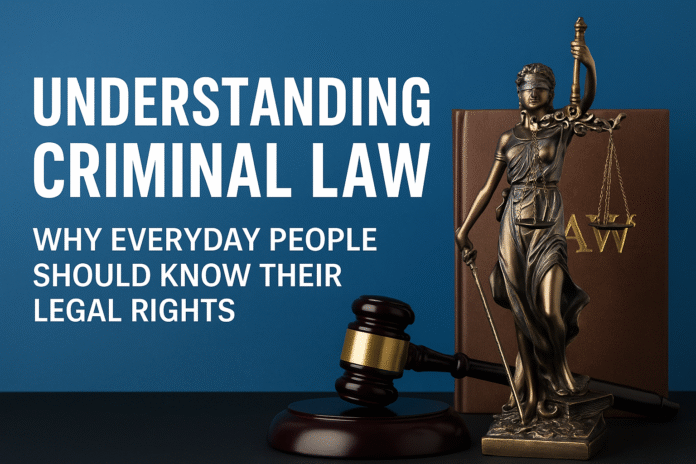When people hear the term criminal law, they often think of courtroom drama, police chases, or news headlines. But criminal law is not just for lawyers or those facing charges. It plays a direct role in everyday life, whether you’re a witness, a victim, or someone simply trying to avoid trouble.
Most people never expect to face legal issues. But if it happens, knowing your basic rights under criminal law can make a big difference.
This article explains how criminal law works, what your rights are, and why staying informed matters, especially if you’re living in the U.S. or following global legal developments.
What Is Criminal Law?
Criminal law deals with acts that are considered offenses against the public, the state, or society. These are crimes like theft, assault, fraud, or more serious charges like homicide. When someone breaks a criminal law, they can be arrested, tried, and punished by the state.
Unlike civil law, where one person sues another, criminal law is enforced by the government. It decides guilt or innocence and what penalties, such as jail time or fines, should apply.
Why Criminal Law Matters to You
Most people assume that criminal law only applies to those who commit crimes. If you’ve never been in trouble with the law, it’s easy to think it doesn’t affect you. But the truth is, criminal law touches many parts of everyday life, and you don’t have to be guilty of anything to be involved in a criminal case.
You could be asked to state a witness, even if you didn’t see much. A close friend or family member might get arrested, and you could be pulled into their legal process for support or information.
You might be the victim of a crime, which means you’ll need to report it and work with law enforcement. In some cases, a misunderstanding or mistaken identity could lead to your arrest, even if you did nothing wrong.
In moments like these, what you do next matters. Your freedom, your reputation, and your legal standing could be at risk. If you don’t know how to respond or what your rights are, you might make decisions that hurt you later. That’s why understanding the basics of criminal law isn’t just for lawyers, it’s something every person should learn.
Know Your Rights
If you ever find yourself dealing with police or facing legal questions, you have rights that protect you. In the United States, these rights are part of the Constitution and are meant to ensure fair treatment. But many people don’t fully understand them, and that’s where problems can start.
You have the right to remain silent. This means you don’t have to answer police questions without a lawyer present. You have the right to an attorney, even if you can’t afford one. You have the right to a fair trial, where the burden of proof lies with the prosecution, not you.
You are protected against unlawful searches, so police need a warrant or valid reason to search your home, car, or belongings. You also have the right to know what you’re being charged with, so you’re never left in the dark.
These rights sound simple, but many people give them up without realizing it. They answer questions, allow searches, or admit things they shouldn’t just because they don’t know what they’re allowed to do. This is why legal education matters. Knowing your rights doesn’t mean you’re hiding something, it means you’re protecting yourself the way the law intended.
What Happens After an Arrest?
If someone is arrested, they must be informed of their rights. They’ll usually go through a court process that includes:
- A hearing to understand the charges
- Possible bail or detention
- A trial if they plead not guilty
- Sentencing if found guilty
The criminal justice system can be complex and intimidating. Having a lawyer and understanding the process helps reduce stress and protect your rights.
If you want to explore this in more detail, LawRuleBook’s Criminal Law section breaks down legal processes in a simple, easy-to-understand way. The guides cover topics like arrest procedures, bail, criminal defense, and what to do if you’re charged with a crime.
Common Misunderstandings
Many people believe myths about criminal law, such as:
- “If I’m innocent, I don’t need a lawyer.”
- “Police must always read your rights.”
- “You can’t be charged without evidence.”
In truth, things aren’t always so clear. You can be charged even if you’re wrongly accused. Evidence can be misunderstood. And silence, without proper legal advice, can sometimes be used against you.
That’s why learning about criminal law isn’t just for people in trouble. It’s a smart way to stay informed and protected.
Stay Informed. Stay Empowered.
Criminal law protects society by punishing wrongdoing. But it also protects individuals from unfair treatment. Knowing your rights helps you navigate life with more confidence and less fear.
Whether you live in the U.S., Ireland, or anywhere else, legal systems may differ, but the importance of knowing your rights stays the same. From traffic stops to serious accusations, criminal law touches lives in unexpected ways.
If you want more accessible legal information on criminal matters in the U.S., check out the resources on https://lawrulebook.com/. They explain the law in plain English and help everyday people understand their options.
Final Thoughts
You don’t need to be a legal expert to stay safe and informed. Just understanding the basics of criminal law can help you make better choices and support those around you. Whether you’re reading this from Ireland or the U.S., one thing is clear: legal knowledge is power.

